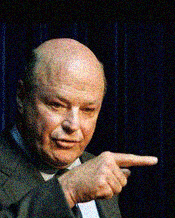 (Pictured: Frank Wisner.)
(Pictured: Frank Wisner.)
At Britain’s Open Democracy, Craig Scott raises that question.
“I see in my mind’s eye the genteel spectacle of Chile’s former President, Augusto Pinochet, taking tea with former British Prime Minister Margaret Thatcher. This was apparently a ritual for the two leaders after their respective retirements as heads of government, whenever the General would visit London. But the image specifically dates to the Thatcher-Pinochet tea tryst only days before Pinochet’s arrest in London in 1999 on an extradition warrant from Spain for his role in various brutalities in Chile, including overseeing its torture system. . . .
“That image popped up again twice in the last year, as I observe Hillary Rodham Clinton careening about in response to events in Sri Lanka and now Egypt – bouncing from (realpolitik) wall to (humanitarian) wall to (pragmatism) wall, in a kind of foreign policy funhouse of mirrors.”
After he catches up Mrs. Clinton once making the statement that “I really consider President and Mrs. Mubarak to be friends of my family,” Scott writes:
The image of Lady Thatcher and the General-President demurely sipping their Earl Grey dissolves into an image of the Clintons and the Mubaraks knocking back a latte or two in the Clintons’ Washington digs, for old times’ sake.
Scott’s next piece for Open Democracy, a British site well worth frequenting if you’re unfamiliar with it, is even more troubling. He analyzes the Frank Wisner debacle. It turns out that Wisner, supposedly sent to Egypt because he served as an ambassador there, currently works for a public relations firm that counts Egypt as a client. Scott asks:
Did President Obama send Wisner as his envoy in full knowledge of Wisner’s employment at Patton Boggs, or was that fact elided by Clinton when recommending Wisner to the President? Was Wisner briefed . . . the President or from Secretary of State Clinton? Did Wisner deliver the message President Obama charged him with conveying to Mubarak, or not, and what was that message, exactly? Was Wisner recalled from Cairo because of leaks of his role or because President Obama, or perhaps Secretary of State Clinton, learned of or suspected he had been off-message? Has Hillary Clinton been pursuing her own direct back channel with Mubarak or Suleiman, and with what messages? Did the idea of appointing Suleiman Vice-President and transitioner-in-chief emerge from discussions involving Wisner and/or Clinton with Mubarak?
In fact,
How is it that someone (Wisner) so versed in foreign relations and just coming off the most crucial of missions for the President could publicly state a position diametrically opposed to what the White House claims to be its own position? Did Clinton know in advance what Wisner was going to say or even actively encourage Wisner’s remarks?
Based on what we know now, by recommending Frank Wisner to be the President’s envoy to Cairo, Clinton could not have snookered Obama better if she had tried. The bigger question is whether this is in fact exactly what she tried – and also whether she has, in the result, succeeded given how the US seems to have lined up behind the Suleiman Transition as ‘solution.’
For the latest, see the Sunday New York Times report, In U.S. Signals to Egypt, Obama Straddled a Rift.